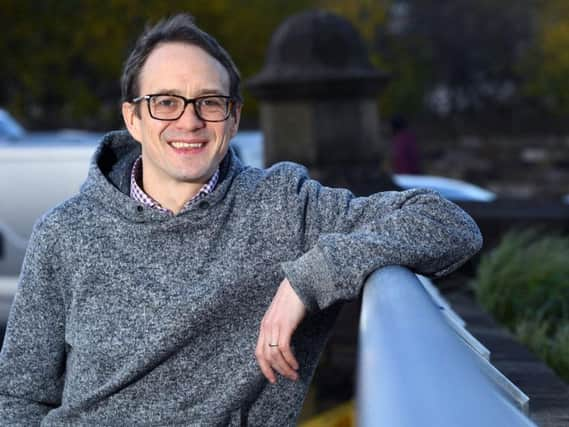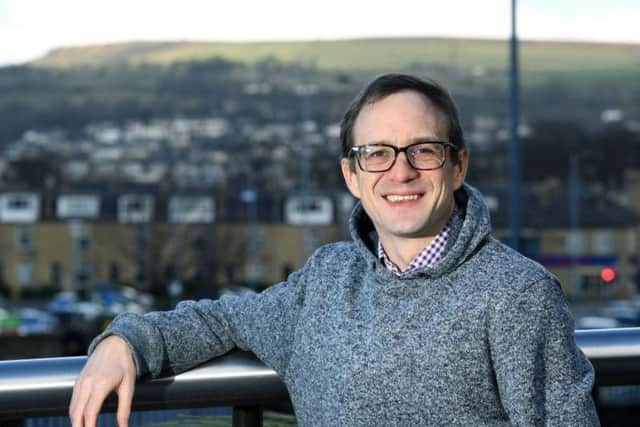Chris Mason interview: Now is the best time I've ever known to be a BBC political correspondent


"It felt like my face had been strapped to the side of a rocket and had been blasted off, you wave goodbye to this rocket and I hadn't even set it off. Off it has gone and it's out of control."
Sipping tea in a cafe next to Keighley railway station, BBC Political Correspondent Chris Mason reflects on the week when an ad-libbed comment he made about the uncertainties facing the Brexit process was heard around the world thanks to the very modern magic of social media.
Advertisement
Hide AdAdvertisement
Hide AdThe Yorkshire-born reporter, delivering a piece to camera for BBC Breakfast a few days before a withdrawal agreement was reached between the UK and European Union, told viewers he didn't have the "foggiest idea" what would happen in the coming weeks.
Referring back to a trail for an interview with Mr Blobby that appeared before his piece, he suggested the 1990s' television favourite's analysis of what the future might hold would be as good as his.
After being picked up by the media in the UK, a clip of his words soon achieved viral status through Twitter, being picked up by the Washington Post and HBO in the US, while daily newspaper Le Parisien dubbed his words into French.
No stranger to scrutiny after more than a decade in various, increasingly high-profile reporting roles at the BBC, the father-of-one admits he was taken completely by surprise at the reaction to his efforts to be honest about the difficulty in attempting to predict the ebbs and flows of Brexit.
Advertisement
Hide AdAdvertisement
Hide Ad"It struck me that it didn't matter how much I knew about it, you hope to have a reasonable if imperfect knowledge of what is going on, it had reached a point where I thought 'we haven't got a clue'," he tells The Yorkshire Post. "We can go on forever about what might happen, this, this and this, but I need to be direct."


The 38-year-old describes himself as "beyond fortunate" to be a BBC Political Correspondent "at the best time in my lifetime to be covering politics". And thanks to his popular Brexitcast podcast he is in a better position than most to get into the weeds of what some have described as the biggest crisis for the nation since World War Two.
Born at Airedale Hospital and growing up in Grassington, North Yorkshire, his passion for journalism meant his only aim from a young age was to be a reporter. Despite now living in London he still has a weekly subscription to his old local newspaper, the Craven Herald.
He is up in Yorkshire to record for a documentary about rural and urban living for Radio 4 but also to unveil a plaque for legendary former Dalesman editor Bill Mitchell, at whose local primary school Mr Mason's mother and father first met.
Advertisement
Hide AdAdvertisement
Hide AdAfter university in Cambridge he started a broadcast journalism traineeship at ITN, whose journalists were racing to cover the latest developments following the 9/11 terror attacks in New York the previous week.
As the planes crashed into the twin towers, he followed the news on BBC radio during his last shift on a campsite in Hawkswick in Littondale, North Yorkshire, selling sweets to campers at tail end of summer season.
Moving over to the BBC after year, he did a stint learning the ropes in the North East before working on the corporation's regional desk at Westminster and then heading to Brussels for two years to serve as Europe Correspondent.
After a spell as a political reporter on BBC Radio 5 Live he became Political Correspondent seven years ago, in which time he has taken on more and more presenting work, including the plum role of hosting BBC Breakfast.
Advertisement
Hide AdAdvertisement
Hide Ad"Sitting on that BBC Breakfast sofa for the first time as a presenter, as I did just over a year ago, you think 'what on earth am I doing here'," he says.
"I was looking at the clock and it is 5.59am on a Sunday and I am sitting next to [presenter] Naga Munchetty, it is just one of those massive out-of-body experiences and feeling imposter syndrome. I had a flashback, and I had forgotten how I felt until that moment, of the first time I sat in front of a microphone, broadcasting. As you get older you get fewer of those first time moments."
He talks passionately about Brexitcast, a podcast available for listeners to download which ran for six months with little attention before getting some added stardust with the addition of Political Editor Laura Kuennsberg and Europe Editor Katya Adler.
"If you are someone like Laura Kuennsberg, who is brilliant and fantastic to work with and is getting an incredible range of briefings about what is going on, on the 10 O'Clock news you are only going to be on for a minute or two, at three words a second it is not many words.
Advertisement
Hide AdAdvertisement
Hide Ad"She has to condense it down, and that is something we never have to worry about on Brexitcast because we just ramble on. It is an outlet for the level of knowledge that she, Katya and [co-host] Adam [Fleming] have on some of the detail of Brexit because they have been devoted to it for two years."
The BBC's coverage of Brexit is scrutinised more than anywhere else for hints of perceived bias, but as far as Mr Mason is concerned complaining about the attention "is like a sailor complaining about the sea".
He says Political Editor Laura Kuennsberg, who reportedly had to be accompanied by a security detail at Labour conference because of the online abuse she receives, gets a "turbo-charged version" because she is on the biggest stage.
"It's right that as a reporter you are scrutinised, we get a lot of grief on Twitter from both sides. People will tell me on Twitter I have an agenda for X and Y, and sometimes within a few minutes I will be accused of both X and Y.
Advertisement
Hide AdAdvertisement
Hide Ad"I will say 'by all means call me c***, sometimes I am, I might have made a duff judgement, or put two and two together and made five, but there is no conspiracy, there is no agenda'. It is just all about the facts and story."
Like most journalists covering Brexit, he faces the challenge of making constitutional change that is essentially about process interesting to a public who, quite reasonably are more interested in the outcome of how it will affect their lives.
He insists that there is no conflict in covering heavy political issues in an informal way and that it's OK to talk about the issues with "a bit of personality", particularly working in a medium, television, which places a premium on the kind of eye-catching images most political stories tend to lack.
Nevertheless, after over-hearing a couple of dads at a school Christmas fair near his home talking about influential Tory backbencher Jacob Rees-Mogg, he believes there is a window about to open up in the coming weeks and months where "politics becomes properly mainstream".
Advertisement
Hide AdAdvertisement
Hide Ad"I think pretty much everyone gets that Brexit in the big picture, in the macro, is massive, but Brexit in the micro can be a bit dull. The analogy I like to use is that the referendum result was a bit like an electrician telling you that you have to get the house re-wired," he says.
"The decision has been made, so you can have an argument for ever and ever about whether having it re-wired is worth it, or whether it will be better afterwards. There is an acceptance that will be a messy process, and it's a big job.
"When I as the person reporting on this re-wiring suddenly sounds incredibly passionate about the removal of that plug socket, everyone else just thinks 'it's just a plug, tell me when it's done'."